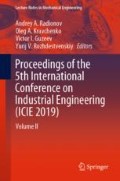Abstract
The problem of economic use of resources is among the most important for modern production. Most of the technological processes for the manufacture of industrial products are accompanied by the generation of different kinds of wastes. Industrial wastes exert a negative impact on human health and contribute to environmental degradation. Minimization of the amount and impact of industrial wastes allows to improve environmental protection. The chapter investigates the problem of implementing the environmental safety of technological processes. The issue of resource-saving metal-processing industrial equipment is considered. The purpose, properties, requirements, physical, and chemical principles of action of the lubricating-cooling technological liquid as a component providing effective functioning of metal-processing manufacturing equipment are analyzed. The main advantages of epilam application are reviewed. The possibility of using epilam as the additional component in lubricating-cooling technological liquid to ensure high quality and anti-corrosive protection of processed products is studied. The automated resource-saving system for use and regeneration of lubricating-cooling technological liquid based on epilam is analyzed.
Access this chapter
Tax calculation will be finalised at checkout
Purchases are for personal use only
References
Bukeihanov NR, Cmir IM (2008) Innovative approaches to solving resource problems in engineering. VESTNIK MSTU “STANKIN” 4(4):161–166
Bukeihanov NR (2008) Control of innovative resource projects. VESTNIK MSTU “STANKIN” 3(3):66–70
Bukeihanov NR, Cmir IM, Hairo DA, Sergeev VN (2010) Heuristic methods of modernization of machine-building enterprises manufactures. VESTNIK MSTU “STANKIN” 3:75–79
Bukeihanov NR (2009) Renovation of technological processes—tool of resourcekeeping and improving of ecological security. VESTNIK MSTU “STANKIN” 4(8):21–24
Bukeihanov NR, Gvozdkova SI, Nikishechkin AP (2017) Hierarchy of needs A. Maslow and need for management. Russian regions: looking into the future 4(4):15–28
Shvartsburg LE (2008) Environmental ensuring of forming technology. VESTNIK MSTU “STANKIN” 1:38–43
Shvartsburg L (2015) Ecoenergetics of cutting manufacturing processes. Ecol Ind Russ 19(3):4–9. https://doi.org/10.18412/1816-0395-2015-3-4-9
Shvartsburg LE (2010) Analysis of the energy safety of technological process. VESTNIK MSTU “STANKIN” 4(12):98–105
Shvartsburg LE (2008) Human and environmental protective ensuring of automated engineering. VESTNIK MSTU “STANKIN” 3(3):19–21
Zmieva KA, Shvartsburg LE (2009) Automated energy and resource saving systems for industrial enterprises. Ecol Ind Russ 11:7
Bukeikhanov NR, Gvozdkova SI, Nikishechkin AP (2017) Automation of the technological system ≪gas nitriding—recycling processes≫. In: 2017 international conference on industrial engineering, applications and manufacturing, IEEE, p 1–5. https://doi.org/10.1109/icieam.2017.8076447
Bukeikhanov NR, Nikishechkin AP, Gvozdkova SI (2018) Automation of lighting systems of enterprises using solar energy. Bull Sci Pract 4(5):277–284
Shvartsburg LE, Zvenigorodskij UG, Bukeihanov NR (2001) Methodology of resource saving projects development. VESTNIK MSTU “STANKIN” 2(14):14–17
Shvartsburg LE, Ivanova NA, Ryabov SA, Gvozdkova SI, Zmieva KA (2012) Automation of maintenance of indicators safety for machine-building technologies formation of the form. Scientific, practical and educational-methodical. J Life Safety S2:1–24
Butrimova EV, Yagolnitser OV, Shvartsburg L (2017) Automation of management of ecological parameters of the technological processes of cutting on the basis of forecasting their negative impact on the person and environment. Int J Eng Sci Res Technol 6(11):379–383. https://doi.org/10.5281/zenodo.1054609
Shvartsburg LE, Butrimova EV, Yagolnitser OV (2017) Quantitative evaluation of the effectiveness of best available technologies of form-shaping. In: MATEC web of conferences 129(01027). https://doi.org/10.1051/matecconf/201712901027
Gvozdkova SI, Shvartsburg LE (2017) Analysis of sources and methods for reducing noise by minimizing vibrations of engineering technological processes. Procedia Eng 206:958–964. https://doi.org/10.1016/j.proeng.2017.10.578
Gvozdkova S (2015) Analysis of provision methods of environmental safety by minimization of energy losses by the example of industrial vibration and noise. Ecol Ind Russ 19(3):14–17. https://doi.org/10.18412/1816-0395-2015-3-14-17
Hudoshina MY, Butrimova OV (2008) Database of on lubricate cooling technological means: the formation, structure, functioning in uniform information space. VESTNIK MSTU “STANKIN” 3(3):45–51
Hudoshina MY, Butrimova OV (2010) Stage conceptual design of a database on lubricate cooling technological means, systems, applications and utilization. VESTNIK MSTU “STANKIN” 1(9):150–154
Rodriguez PE, Shvartsburg LE, Artemyeva MS (2017) Methodological design and commissioning of an experimental stand for the study of the spread of harmful substances in the air of work areas during the processing of metals in industry. Procedia Eng 206:588–593. https://doi.org/10.1016/j.proeng.2017.10.521
Shvartsburg LE, Ivanova NA, Ryabov SA, Zaborowski T (2014) Chemical contaminations in a process of polishing with an implementation of liquid LCTS. Life Sci J 11(10s):228–230
Ivanova NA, Ryabov SA, Shvartsburg LE (2015) The reduction of energy consumption of technological processes with application of the liquid lubricant-cooling technological substance. J Life Safety 6(174):47–50
Author information
Authors and Affiliations
Corresponding author
Editor information
Editors and Affiliations
Rights and permissions
Copyright information
© 2020 Springer Nature Switzerland AG
About this paper
Cite this paper
Bukeikhanov, N.R., Gvozdkova, S.I., Butrimova, E.V. (2020). Automated Resource-Saving System for the Use and Regeneration of Epilam-Based Lubricating-Cooling Technological Liquid. In: Radionov, A., Kravchenko, O., Guzeev, V., Rozhdestvenskiy, Y. (eds) Proceedings of the 5th International Conference on Industrial Engineering (ICIE 2019). ICIE 2019. Lecture Notes in Mechanical Engineering. Springer, Cham. https://doi.org/10.1007/978-3-030-22063-1_151
Download citation
DOI: https://doi.org/10.1007/978-3-030-22063-1_151
Published:
Publisher Name: Springer, Cham
Print ISBN: 978-3-030-22062-4
Online ISBN: 978-3-030-22063-1
eBook Packages: EngineeringEngineering (R0)

